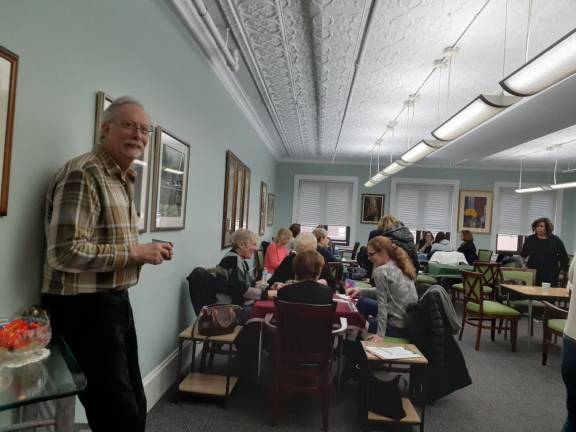A Chess Players Chance Encounter with Bridge Gave Him a Whole New Career
Management of tennis clubs during the 1970s tennis boom, gave the one time chess enthusiast-turned-bridge player the base of mangement skill to combine with his love of bridge that launched him into a new career. Jeff Bayone now runs a thriving Upper East Side bridge club Bridge & Games, that is spread over two floors in an E. 87th St. building.

Through most of his college days, Jeff Bayone–who was on chess teams since high school–admits he thought of bridge as nothing more than a “little old lady game.”
But in his senior year, after a chance encounter with a chess master who was also an expert bridge player, he was intrigued enough to take up the past time. Since then, he’s discovered a whole new world of enthusiasts that ultimately propelled him into a new career. He is now the owner of a booming upper east side bridge establishment that survived the pandemic and added a whole new world of online enthusiasts to its ranks.
“Pre-pandemic we had three bridge clubs in the city–one of which was the largest bridge club in the country,” said Bayone, founder and operator of Bridge and Games, formerly Honors Bridge Club, now located on two floors in the same building on the Upper East Side.
Since reopening fully for in person classes and games in May of last year, the bridge-playing New York City crowd has been flocking back to the East 87th Street location for tournaments and social bridge, while a newly thriving online community has added new enthusiasts and clients to the club. And for those who like to play a variety of ‘mind games’, or want to learn, canasta, mah jongg, even scrabble and backgammon, are offered at varying levels and fe
“I was a chess player in college and high school and I was on the chess team and one of the other players on the team got sick and we needed a replacement and someone suggested a person who was a bridge player, and I said ‘but [he] is a bridge player.’” To which the person responded “and he is also one of the strongest players in the city in chess.”
The Manhattanite who was born and raised on the lower East Side, became intrigued and started learning the game himself. “And it turns out, having played chess and bridge, I can just tell you that bridge is so much more than chess,” Bayone said, adding that that is because of the element of sociability, the fact that you need to work with a partner when playing.
“See, bridge is a partnership game, chess is solitary, you play against someone. In chess you try to destroy your opponent’s ego. And bridge, what you try to do, you and your partner, you try to work together to destroy your opponents’ ego. But at least you’re working together,” he said. Everything’s better with a partner it seems.
Bayone taught in the New York City public schools–for three months –after graduation. It was not for him, he said. Soon after that he went into the indoor tennis club business as a manager in the early to mid-1970s when “tennis was just coming into its heyday” and later learned to play well enough to be an instructor. All this time he was playing bridge in earnest, now part of a bridge club on the Upper West Side.
Having done very well in the tennis management business, the opportunity to open his first bridge club came in the mid-70s.
“In 1976 the bridge club that I was attending [on the Upper West Side] went out of business and I went to the landlord and said If ‘I pay the back rent, will you open up again?’ That’s how I got started in bridge [clubs].”
He used money he saved while working as a tennis club manager during the tennis boom years to pay for the back rent. “I made a ton of money and stuck it into buying a bridge club,” he said.
“When the bridge club started making money, I left the tennis world behind.” The club moved several times on the west side and about 10 years ago moved to the east side.
On a recent Tuesday afternoon at the Bridges and Games space on East 87th Street, several dozen participants were seated at about 15 tables in lively conversation preparing to start a bridge tournament, when the room suddenly went “pin-drop” silent as the tournament started, something Bayone had explained would happen.
Bayone and his wife now live in Astoria “literally right across from the bridge club” across the river--where on nice days he goes by scooter to the ferry taking it to Carl Schurz Park, then scoots to the club, a good bet that cuts his travel time in half, to only about 20 minutes each day.
Bayone’s also authored two books on the topic: It’s Bridge, Baby in 1998 and A Taste of Bridge in 2017. In the foreword of A Taste of Bridge, a beginner’s book, he wrote: “You’ve probably heard a friend say something like, ‘Oh, bridge is so complicated.’ Well let me assure you, it is! It’s complicated — but not hard.”
Bridge is a partnership game, chess is solitary, you play against someone. In chess you try to destroy your opponent’s ego. And bridge, what you try to do, you and your partner, you try to work together to destroy your opponents’ ego.” Jeff Bayone, a one time chess enthusiats, now owner of Bridge and Games, an Upper East Side bridge club.